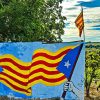
As a Spanish and European citizen, I write these lines mired in profound sadness. Something has gone wrong in my country. I ask myself how can it be that Catalonia, one of the most prosperous, autonomous, cosmopolitan, modern and attractive regions on earth, is about to jump over a cliff? The situation is so tense that the level of anxiety, medical visits and sleepless nights has increased both in Catalonia and the rest of Spain over the past weeks. After the so-called referendum of 1 October 2017 – when images of riot police beating voters reached all corners of the world– most of my colleagues at the Elcano Royal Institute were unable to sleep properly, as I was myself. We feared that the following weeks would be dramatic and, to some extent, they have been.
On 10 October Carles Puigdemont, the Premier of the Catalan regional government, first announced a unilateral declaration of independence and seconds later suspended it – calling for dialogue–. A few days later, Spain’s Prime Minister, Mariano Rajoy, sent him a letter asking him to confirm whether he had declared independence. If so he would trigger article 155 of the Spanish Constitution, which partially suspends the autonomous status of Catalonia. However, if Puigdemont were to backtrack, Rajoy would be willing to engage in dialogue but always within the current legal framework. In other words, Rajoy sent a clear message to Puigdemont: ‘secession is not on the cards, no matter how hard you push’.
However, Puigdemont pushed hard because in his letter of response he explained that independence had been declared and then suspended, but that if the Spanish Government refused to go to the negotiating table and instead trigger article 155, the Catalan Parliament would vote the declaration of independence. This apparent threat led Rajoy to call for the application of article 155 by the Senate, starting on Friday 27 October. In response, on the same day, Puigdemont finally opted for a unilateral declaration of independence in the Catalan Parliament. Brinkmanship had taken everyone to the very edge. Catalonia is now governed from Madrid while Rajoy has called for regional elections to be held on 21 December.
This ‘game of chicken’, reminiscent of the confrontation between the Syriza government and the Eurogroup in 2015, has, of course, its economic costs. During the diplomatic toing and froing between Puigdemont and Rajoy, most of the major Catalan companies, including the two leading banks, CaixaBank and Sabadell, moved their legal headquarters to other parts of Spain. The business community has had enough of the independence pipedream and has started to vote with its feet. Roughly 150 companies moved out of Catalonia every day in October, and the total is now almost 2,000, although the sacked Catalan Government did not seem to care that much. It continued to say, and is still claiming, that it has all been a Madrid ploy to foil Catalonia.
Adding further tension to the drama, on 16 October a Spanish High Court judge, Carmen Lamela, ordered the two leaders of the main pro-independence civil society organisations –Jordi Sànchez (ANC) and Jordi Cuixart (Òmnium)– to be remanded in custody. On 2 November, following the proclamation of independence, the entire former cabinet of the the Catalan regional government (Generalitat) –apart from Carles Puigdemont and a few other members who fled to Belgium– was also brought into custody on charges of sedition, which the Oxford dictionary defines thus: ‘conduct or speech inviting people to rebel against the authority of a state or monarch’. Indeed, I believe sedition is what we have witnessed in Catalonia. There seems no better word to describe the situation. I am also convinced the Catalan government’s actions are not for a noble cause (I don’t think Gandhi would have approved). In the following paragraphs I shall try to explain my position on the matter.
As a Galician who speaks Galician at home with his parents but was born and raised in Basel (Switzerland), where the language used in daily life is baseldütsch (which is quite distinct from Hoch Deutsch, High German), I have always been sympathetic to the Catalan’s desire to preserve their regional language and culture. I have also admired the Catalan people’s capacity to be highly organised, fight for greater autonomy and, whenever their moderately conservative ‘nationalist’ party Convergencia i Unió (CiU) was necessary to build a majority in the Spanish parliament, extract from the central government in Madrid as many concessions and privileges as possible. Yes, in certain ways, I admired the Catalans. I thought we Galicians should do the same. Only thus would we obtain the infrastructures necessary to be connected to the outer world. Bear in mind that even today the train journey from Madrid to A Coruña (where my parents live) lasts six hours, while that from Madrid to Barcelona two and a half although the distance is similar.
Politics –democratic politics that is– is a game, and the Catalans have always played it rather well. So much so that they have convinced many people, including myself until relatively recently, that they should have the so-called ‘right to decide’ their future (the Catalan version of the right of self-determination). As the Scots and the Québécois had the opportunity to decide in a referendum whether they wanted to be independent or not, why should the Catalans not have the same right? Overall surveys show that roughly 80% of Catalans want to be able to have a vote on the matter.
Following this reasoning, I have always thought that if one part of Spain wants to leave, then the rest of Spain has a problem: it is not attractive enough. Perhaps a referendum (as I thought when I was living in the UK regarding a referendum on the EU) would finally make the case for staying easier to understand, as intellectuals and politicians would come out and explain why it makes sense for Catalonia to be part of Spain.
However, I was wrong on both Brexit and Catalonia. In recent years, after many discussions with a cousin of Galician origin but born in Catalonia, who feels Catalan and speaks Catalan daily, I began to change my mind. He pointed out in no uncertain terms that according to the Spanish Constitution – incidentally approved by roughly 90% of Catalans in 1978– the only sovereign entity is the Spanish people and that any decision affecting them needs to be decided by Spain as a whole. In other words, if Catalonia votes to be independent this would affect him as a Catalan but also me as a Spaniard, so I should have the same right to vote as he has. Looked at from this angle, things are slightly different: Spain has a problem if Catalonia wants to secede, but Catalonia, or at least those who seek independence in Catalonia, equally have a problem if they are unable to convince the rest of Spaniards that it is in the best interests of the Spanish, who are sovereign, for the Catalans to have ‘the right to decide’.
The democratic tools are certainly there. The Spanish Constitution can, and could, be reformed in order to allow for a binding referendum on Catalonia. To do that, it would be necessary to have a two-thirds majority of the votes in the Spanish Parliament. That may seem to be setting the bar high, but all advanced western democracies have high thresholds for institutional changes of such magnitude. The separatists in Catalonia claim the argument is fallacious: it would be impossible for them to gain two-thirds support in the Spanish Congress and –after years of tirelessly seeking negotiations– they are therefore left the unilateral route as the only resort.
This is a weak argument. One cannot just say ‘oh, I don’t like this type of democracy. I have tried to change it, but I can’t, so I will create my own democracy’. While no Spanish government has ever had an electoral mandate to negotiate a referendum with the Catalan authorities (because the overwhelming majority of Spaniards do not want it and this needs to be respected, something that the secessionists in Catalonia forget), over the years, support for a binding referendum has increased in Spain. In fact, Podemos, the new left-wing party which gained over 20% of the vote in the last general election in 2016 and which draws support from all over Spain, is in favour of the idea. Who knows? Perhaps in 10 or 20 years’ time the issue will have ample support among Spanish citizens (in Part 3 of this trilogy I discuss the appropriateness of a referendum as a solution to the conflict).
But no, the Catalan secessionists have had neither sufficient patience nor the necessary long-term strategy to convince the rest of Spain, and neither have they had the support of a majority of Catalans in the first place. For them, independence had to be achieved now, no matter what. As you can understand, this is not very democratic.
[An earlier version of this text was published on Medium.]


